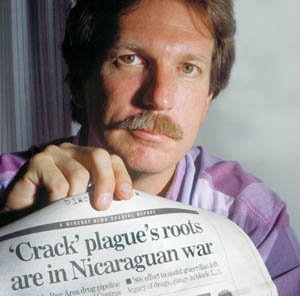Cross-posted from Consortium News
In 1996 -- as major U.S. news outlets disparaged the Nicaraguan Contra-cocaine story and destroyed the career of investigative reporter Gary Webb for reviving it -- the CIA marveled at the success of its public-relations team guiding the mainstream media's hostility toward both the story and Webb, according to a newly released internal report.
Entitled "Managing a Nightmare: CIA Public Affairs and the Drug Conspiracy Story," the six-page report describes the CIA's damage control after Webb's "Dark Alliance" series was published in the San Jose Mercury-News in August 1996. Webb had resurrected disclosures from the 1980s about the CIA-backed Contras collaborating with cocaine traffickers as the Reagan administration worked to conceal the crimes.
In fall 1998, when the CIA inspector general's extraordinary findings were released, the major U.S. news media largely ignored them, leaving Webb a "disgraced" journalist who -- unable to find a decent-paying job in his profession -- committed suicide in 2004, a dark tale that will be revisited in a new movie, "Kill the Messenger," starring Jeremy Renner and scheduled to reach theaters on Oct. 10.
The "Managing a Nightmare" report offers something of the CIA's back story for how the spy agency's PR team exploited relationships with mainstream journalists who then essentially did the CIA's work for it, mounting a devastating counter-attack against Webb that marginalized him and painted the Contra-cocaine trafficking story as some baseless conspiracy theory.
Crucial to that success, the report credits "a ground base of already productive relations with journalists and an effective response by the Director of Central Intelligence's Public Affairs Staff [that] helped prevent this story from becoming an unmitigated disaster.
"This success has to be viewed in relative terms. In the world of public relations, as in war, avoiding a rout in the face of hostile multitudes can be considered a success. ... By anyone's definition, the emergence of this story posed a genuine public relations crisis for the Agency." [As approved for release by the CIA last July 29, the report's author was redacted as classified, however, Ryan Devereaux of The Intercept identified the writer as former Directorate of Intelligence staffer Nicholas Dujmovic.]
According to the CIA report, the public affairs staff convinced some journalists who followed up Webb's expose by calling the CIA that "this series represented no real news, in that similar charges were made in the 1980s and were investigated by the Congress and were found to be without substance. Reporters were encouraged to read the 'Dark Alliance' series closely and with a critical eye to what allegations could actually be backed with evidence. Early in the life of this story, one major news affiliate, after speaking with a CIA media spokesman, decided not to run the story."
Of course, the CIA's assertion that the Contra-cocaine charges had been disproved in the 1980s was false. In fact, after Brian Barger and I wrote the first article about the Contra-cocaine scandal for the Associated Press in December 1985, a Senate investigation headed by Sen. John Kerry confirmed that many of the Contra forces were linked to cocaine traffickers and that the Reagan administration had even contracted with drug-connected airlines to fly supplies to the Contras who were fighting Nicaragua's leftist Sandinista government.
However, in the late 1980s, the Reagan administration and the CIA had considerable success steering the New York Times, the Washington Post and other major news outlets away from the politically devastating reality that President Ronald Reagan's beloved Contras were tied up with cocaine traffickers. Kerry's groundbreaking report -- when issued in 1989 -- was largely ignored or mocked by the mainstream media.
That earlier media response left the CIA's PR office free to cite the established "group think" -- rather than the truth -- when beating back Webb's resurfacing of the scandal in 1996.
A "Firestorm" of Attacks
The initial attacks on Webb's series came from the right-wing media, such as the Washington Times and the Weekly Standard, but the CIA's report identified the key turning point as coming when the Washington Post pummeled Webb in two influential articles.
The CIA's PR experts quickly exploited that opening. The CIA's internal report said:
"Public Affairs made sure that reporters and news directors calling for information -- as well as former Agency officials, who were themselves representing the Agency in interviews with the media -- received copies of these more balanced stories. Because of the Post's national reputation, its articles especially were picked up by other papers, helping to create what the Associated Press called a 'firestorm of reaction' against the San Jose Mercury-News."
The CIA's report then noted the happy news that Webb's editors at the Mercury-News began scurrying for cover, "conceding the paper might have done some things differently." The retreat soon became a rout with some mainstream journalists essentially begging the CIA for forgiveness for ever doubting its innocence.
"One reporter of a major regional newspaper told [CIA] Public Affairs that, because it had reprinted the Mercury-News stories in their entirety, his paper now had 'egg on its face,' in light of what other newspapers were saying," the CIA's report noted, as its PR team kept track of the successful counterattack.
(Note: You can view every article as one long page if you sign up as an Advocate Member, or higher).






